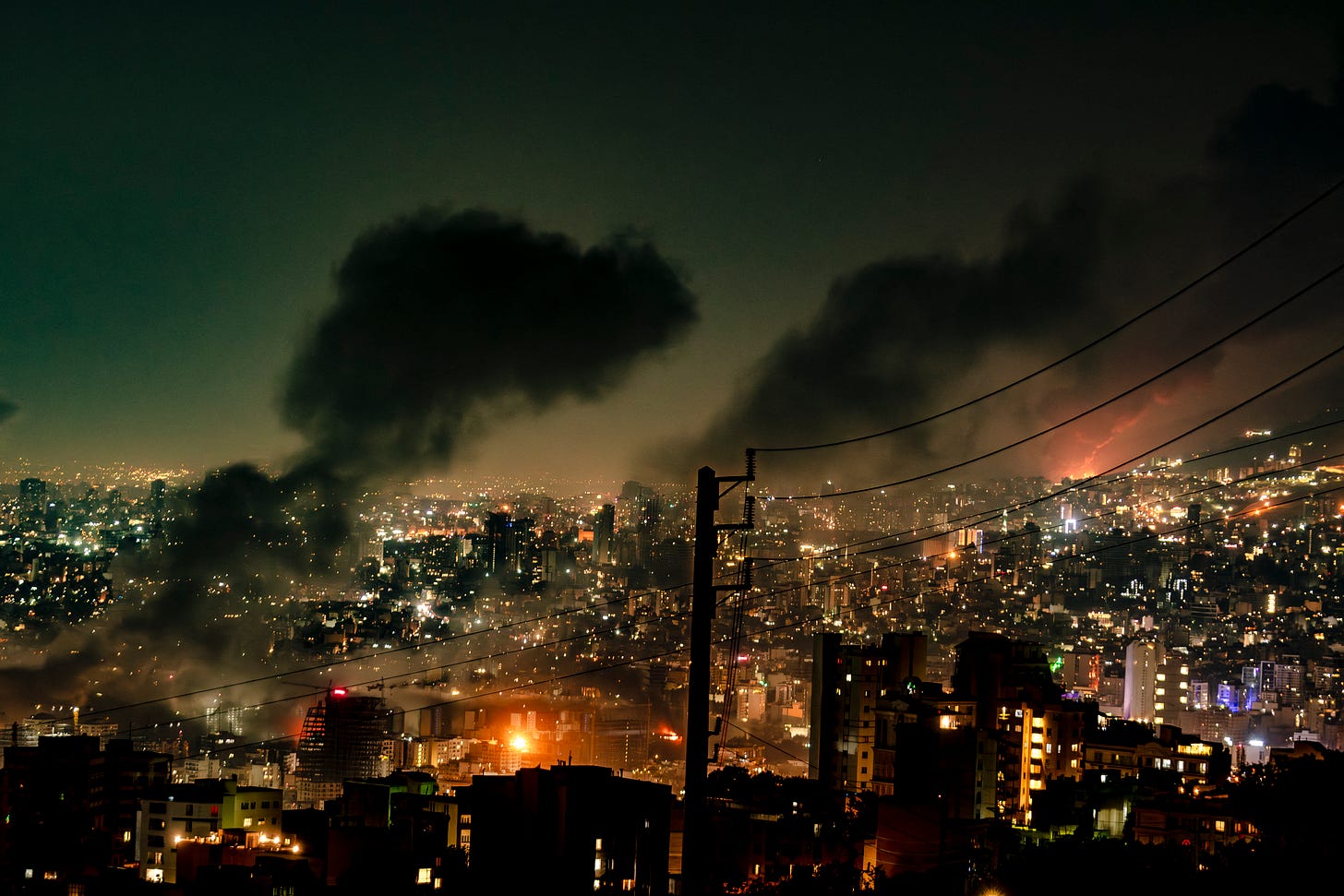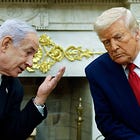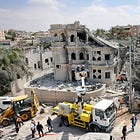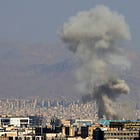Zeteo's Coverage of the War on Iran – Context You Won't Find Elsewhere
A digest of all our recent discussions, commentary, and analysis on the US and Israel's war on Iran.

Over the past week, we here at Zeteo have published several interviews, columns, and sharp analyses by experts and contributors, including Mehdi, on Israel’s war on Iran, which the US has now joined. In the wake of Donald Trump’s illegal bombing on Saturday of Iran’s IAEA-inspected nuclear facilities Fordow, Natanz, and Isfahan, we wanted to re-share what we’ve published so far on this rapidly escalating conflict, in case you missed any of it.
Let us know what you’ve thought of our coverage so far – and what you’d like to see more of when it comes to Israel’s latest, and growing, escalation in the Middle East.
What: Immediately after news broke of US strikes in Iran, Mehdi was joined by Iran-expert Trita Parsi on a Substack and YouTube Live to discuss why the US bombed Iran, what role Israel had in it, how Iranian society is reacting, and how Iran could respond.
Context: A live conversation reacting to the breaking news and putting it in context.
Why you should care: Trita explains what will likely be the consequences of the US striking Iran, disagrees with Mehdi on some of Trump’s actions, and predicts what Iran could do in the next few years.
What: In this article, Zeteo contributor Spencer Ackerman traces the origins of the US war with Iran and questions Senate Minority Leader Chuck Schumer and other Democrats’ positions.
Context: A reaction to the US bombing of Iran and an explanation of what got us here from a domestic perspective.
Why you should care: The article highlights the tensions within the MAGA movement when it comes to Trump’s war and explains why this war started in 1953, joining all the dots.
What: Mehdi hosts a live panel discussion with 500 guests in Los Angeles, with Reza Aslan, an Iranian-American author and academic, and Tommy Vietor, a former Obama National Security Council spokesman and the co-host of ‘Pod Save America.’
Context: This panel discussion is part of Zeteo’s multi-city tour, which saw its final stop in LA on Thursday, June 19.
Why you should care: There is a lot of misinformation around Israel and the US’s reasoning for attacking Iran. This discussion adds some much-needed context that paints a clearer picture, including Donald Trump’s decision to tear up the historic Iran nuclear deal in 2018.
What: Despite US denial, Israel is not single-handedly waging its war on Iran, and the US is complicit by green-lighting its bombing campaign.
Context: On June 13, Israel launched a campaign of strikes against nuclear and military facilities in Iran. Although at the time Trump hadn’t officially “approved” the bombing campaign, he had given Israel a green light by not saying no – and we now know how significant this information was.
Why you should care: Although the strikes have now taken place, this piece captures and clarifies the moments leading up to it – and how while the Trump administration was making it seem it like they weren’t involved, Ken’s sourcing suggests that wasn’t true at all.
What: Iran’s bombing campaign on Israel shed light on the inequality of safety infrastructure available to Israelis compared to Palestinian citizens of Israel. Zeteo contributor Diana Buttu, who lives in Haifa, highlights how vast the disparity is.
Context: Out of 71 Palestinian towns examined in 2018, only 11 had public shelters at the time. This piece is a personal account of what those stats feel like right now.
Why you should care: An Iranian missile that hit a family home in the Palestinian town of Tamra killed four members of the same Palestinian family. Jewish Israeli residents of the neighboring Mitzpe Aviv were seen cheering as the missile hit. With fighting between Israel and Iran showing no signs of de-escalation, more and more Palestinians could fall victim to the lack of protection provided to them by Israel from rocket fire.
What: In his pursuit of an electoral meal ticket, Benjamin Netanyahu’s war with Iran is a desperate attempt at political revival, but without US support, it is a near-impossible task. Former Israeli peace negotiator Daniel Levy explains.
Context: Netanyahu has been running out of political road, his coalition has been in serial crises, and he has trailed substantially in the polls for 20 months. He hoped that the war with Iran would be considered a national success, and he could keep himself in power.
Why you should care: Israel’s stated war goal is to destroy Iran’s nuclear capabilities, but as it becomes clear that it is nowhere close to accomplishing that goal, Israel needed the US to become involved.
What: Western media’s coverage of the Israel/Iran war consistently leaves out one crucial detail: Israel has nukes but won’t admit it and won’t allow international inspectors either. In this two-minute video, Mehdi does what he does best: he breaks down the double standard that always paints Israel as the victim.
Context: Israel is estimated to have 90 nuclear warheads, and yet it is not a signatory to the Treaty on the Non-Proliferation of Nuclear Weapons (NPT). Iran has no nuclear deterrent, per international inspectors and the global intelligence community, and is actually a signatory to the NPT.
Why you should care: Western media is failing its journalistic duty and misleading you on what the full picture really is.
What: Israel’s reasons for attacking Iran are riddled with inaccuracies and outright lies. Former Defense Intelligence Agency official Harrison Mann outlines seven lies around what he describes as a “war of choice.”
Context: Many have likened Israel’s reasons for attacking Iran to the US’s reasons for invading Iraq in 2003, lies. Netanyahu is repeating the same claims and warnings he’s been making about Iran’s fictitious nuclear weapons since the 1990s. Earlier this year, however, US Director of National Intelligence Tulsi Gabbard affirmed that Iran was not even trying to build a nuclear weapon.
Why you should care: Israel’s lies are what is making its war with Iran possible. Let’s set the record straight.
What: Israel struck key nuclear sites and killed top leaders in Iran – including military personnel and scientists – arguing it was a necessary self-defense measure against an impending Iranian nuclear strike. Zeteo’s political correspondent Prem Thakker and Iranian-American academic and policy adviser Vali Nasr break down the details – and debunk the lies.
Context: Israel’s attacks came hours after the end of Donald Trump’s 60-day deadline for Iran to strike a nuclear deal. Since that attack, Iran carried out several volleys of missiles that killed 10s of Israelis and injured hundreds.
Why you should care: If Iran is forced to its knees or destabilized, the future of a region with an unchecked Israeli superpower could sink it into more chaos than already exists. Vali Nasr explains the repercussions of such a scenario.
If you’re a paid subscriber, let us know in the comments what you think of our coverage so far, and what you’d like to see us do next on this significant and developing story.
If you’re a free subscriber, and you appreciated this digest and our coverage of the war so far, considering supporting us by upgrading your subscription or making a donation here. Every little bit goes a long way in helping us do more.












I admire you and your team. That is no small thing at this time in history.
Trita Parsi’s commentary on this is a must watch. This situation is honestly out of control. Zeteo is one of the few news outlets giving the full picture.